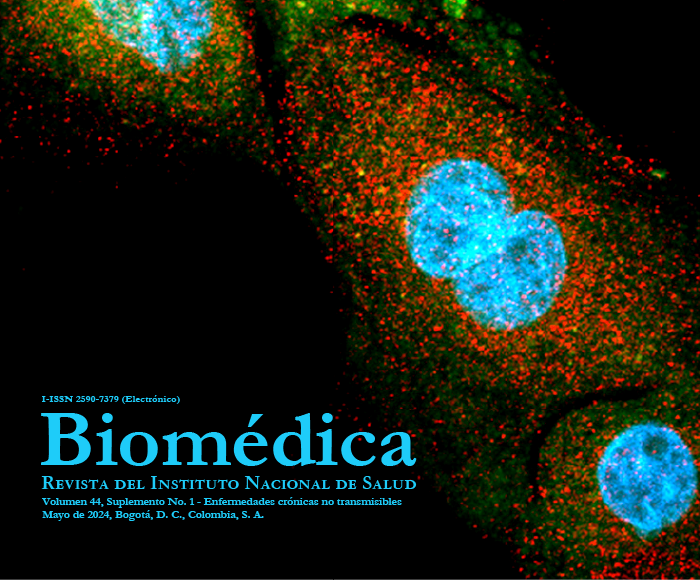Aducanumab: A look two years after its approval
Abstract
Alzheimer’s disease is the leading cause of dementia worldwide and a critical public health problem. While deaths from cardiovascular diseases have decreased, those attributed to Alzheimer’s disease have increased in recent years with no curative treatment to date. In this context, effective treatment development has become a global priority. Aducanumab is a human anti-amyloid β monoclonal antibody approved by the FDA in June 2021 for the treatment of Alzheimer’s disease but failed to show the expected clinical efficacy in phase III trials.
This review analyzes the history of its controversial acceptance, implications, and prospects for future treatment.
Downloads
References
Vaz M, Silvestre S. Alzheimer’s disease: Recent treatment strategies. Eur J Pharmacol. 2020;887:173554-67. https://doi.org/10.1016/j.ejphar.2020.173554
Bun S, Moriguchi S, Tezuka T, Sato Y, Takahata K, Seki M, et al. Findings of 18 F-PI-2620 tau PET imaging in patients with Alzheimer’s disease and healthy controls in relation to the plasma P-tau181 levels in a Japanese sample. Neuropsychopharmacol Rep. 2022;42:437-48. https://doi.org/10.1002/npr2.12281
Alzheimer’s Association. Alzheimer’s disease facts and figures. Alzheimer Dement. 2023;19:33-9. https://doi.org/10.1002/alz.13016
Behl T, Kaur I, Sehgal A, Singh S, Sharma N, Makeen HA, et al. “Aducanumab” making a comeback in Alzheimer’s disease: An old wine in a new bottle. Biomed Pharmacother. 2022;148:112746-55. https://doi.org/10.1016/j.biopha.2022.112746
Neurimmune. Learning from the memory of life to develop transformative immune therapeutics. Accessed: April 12, 2023. Available at: https://www.neurimmune.com/about-us/about-neurimmune
Beshir SA, Aadithsoorya AM, Parveen A, Goh SSL, Hussain N, Menon VB. Aducanumab therapy to treat Alzheimer’s disease: A narrative review. Int J Alzheimers Dis. 2022;2022: 9343514-24. https://doi.org/10.1155/2022/9343514
Dal-Ré R. Aducanumab approval for Alzheimer’s disease in the USA: The surrender of science. Rev Neurol. 2021;73:296-7. https://doi.org/10.33588/rn.7308.2021378
Ferrero J, Williams L, Stella H, Leitermann K, Mikulskis A, O’Gorman J, et al. First-in-human, double-blind, placebo-controlled, single-dose escalation study of Aducanumab (BIIB037) in mild-to-moderate Alzheimer’s disease. Alzheimer’s Dement (NY). 2016;2:169-76. https://doi.org/10.1016/j.trci.2016.06.002
Sevigny J, Chiao P, Bussière T, Weinreb PH, Williams L, Maier M, et al. The antibody Aducanumab reduces Aβ plaques in Alzheimer’s disease. Nature. 2016;537:50-6. https://doi.org/10.1038/nature19323
Budd-Haeberlein S, Aisen PS, Barkhof F, Chalkias S, Chen T, Cohen S, et al. Two randomized phase 3 studies of Aducanumab in early Alzheimer’s disease. J Prev Alzheimer‘s Dis. 2022;9:197-210. https://doi.org/10.14283/jpad.2022.30
Gallo P, Roychoudhury S. Challenges in implementing futility schemes with reference to Aducanumab. Ther Innov Regul Sci. 2023;57:515-20. https://doi.org/10.1007/s43441-023-00499-0
Biogen Inc. Biogen plans regulatory filing for aducanumab in Alzheimer’s disease based on new analysis of larger dataset from phase 3 studies. Accessed: April 17, 2023. Available at: https://investors.biogen.com/news-releases/news-release-details/biogen-plans-regulatoryfiling-aducanumab-alzheimers-disease
Rahman A, Hossen MA, Chowdhury MFI, Bari S, Tamanna N, Sultana SS, et al. Aducanumab for the treatment of Alzheimer’s disease: A systematic review. Psychogeriatrics. 2023;23:512-22. https://doi.org/10.1111/psyg.12944
Alexander GC, Emerson S, Kesselheim AS. Evaluation of Aducanumab for Alzheimer disease: Scientific evidence and regulatory review involving efficacy, safety, and futility. JAMA. 2021;325:1717-8. https://doi.org/10.1001/jama.2021.3854
Rubin R. Recently approved Alzheimer drug raises questions that might never be answered. JAMA. 2021;326:469-72. https://doi.org/10.1001/jama.2021.11558
Salloway S, Chalkias S, Barkhof F, Burkett P, Barakos J, Purcell D, et al. Amyloid-related imaging abnormalities in 2 phase 3 studies evaluating Aducanumab in patients with early Alzheimer’s disease. JAMA Neurol. 2022;79:13-21. https://doi.org/10.1001/jamaneurol.2021.4161
Coerver K, Yu MM, D’Abreu A, Wasserman M, Nair KV. Practical considerations in the administration of Aducanumab for the neurologist. Neurol Clin Pract. 2022;12:169-75. https://doi.org/10.1212/CPJ.0000000000001144
Carome, MA. The FDA’s reckless decision to approve Aducanumab for treating Alzheimer’s disease. Accessed: April 17, 2023. Available at: https://www.citizen.org/wp-content/uploads/2590.pdf
Bejanin A, Schonhaut DR, La Joie R, Kramer JH, Baker SL, Sosa N, et al. Tau pathology and neurodegeneration contribute to cognitive impairment in Alzheimer’s disease. Brain. 2017;140:3286-300. https://doi.org/10.1093/brain/awx243

Copyright (c) 2024 Biomedica

This work is licensed under a Creative Commons Attribution 4.0 International License.
| Article metrics | |
|---|---|
| Abstract views | |
| Galley vies | |
| PDF Views | |
| HTML views | |
| Other views | |

























